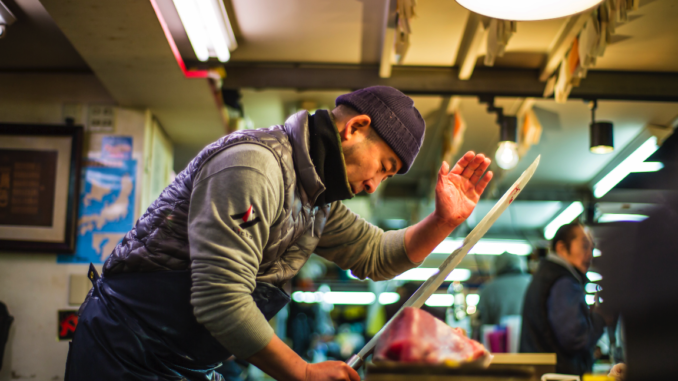
Should you watch this at weekend movie ticket prices? Yes.
Should you watch this more than once? Nah.
Score: 4.0/5
Secret ending? Nope.
Running time: 110 min (~2 hours)
“Tsukiji Wonderland” is a documentary about the history and workings of Tsukiji fish market in Tokyo. It features interviews with Jiro Ono (from “Jiro Dreams of Sushi”) and René Redzepi.
“Tsukiji Wonderland” is a love letter to Tsukiji fish market, which was supposed to move on 7 November but might end up not moving at all. But it’s not just about the legendary seafood hub, as the documentary reveals. It’s about the steadfast dedication of the Japanese to deliver the finest culinary experience possible, from the freshest ingredients to the intimate knowledge of the quirks of seafood to ensuring this heritage is passed on to the next generation. By the end of “Tsukiji Wonderland”, you can almost smell the fish market in the cinema. I did, and so did my viewing partner.
Highlights
For the love of fish
A large part of the film revolves around the intermediate wholesalers, who are the middlemen between the distributors and the fishmongers. It might sound impossibly boring, but their single-minded love and focus on fish is fascinating to watch. They know fish better than they know people, and their knowledge is unrivalled by any text on the subject. Most importantly, their knowledge is borne from the love of fish, rather than a purely commercial motivation.
Japanese work ethic
From chef to distributor to fishmonger to wholesaler, every single person in the supply chain is committed to doing their best, regardless of whether it cuts into profits or if it is laborious. It’s an impressive display of the Japanese work ethic, which brooks no compromises on quality. To see them speak of their craft with such surety and confidence speaks volumes, and gives an experience that stretches far beyond the fish market.
Pure passion
In addition to this work ethic, you can see the tremendous emotion that they imbue their jobs with. For such a tightly conservative and highly reserved society, the fact that you can tell the impending Tsukiji fish market move (although that might not happen anymore) terrifies them is an indication of how much human feeling has been invested. The significance of the fish market goes back generations as several of the intermediate wholesalers can attest to.
Real insight
One of the greatest draws of the film is seeing the whole process of the tuna auctions, something that the public is occasionally barred from doing. Although you don’t get to hear the actual bargaining (it’d be in Japanese and confidential anyway), it’s a breathtaking sight to see so much tuna laid out for the best people in the business, and to watch the auction played out as a high stakes game of poker. This segment alone is worth the price of the ticket.
Letdowns
Lengthy
It’s a romanticised view of the Tsukiji fish market, to be sure, and with the romanticism comes long and pensive scenes. The film clocks in at a hefty 110 minutes, so some trimming could have helped to sustain the interest throughout the film. Nevertheless, many of the quieter scenes are powerful, emotional moments that shows us the inherent passion of the fish market.
“Tsukiji Wonderland” is the best documentary of 2016, hands down.
“Tsukiji Wonderland” opens in cinemas:
– 6 Oct 2016 (Singapore)
This review was also published on Yahoo!
If you like the article, follow me on Facebook and Twitter for more (presumably) good updates!
To get in touch with me, send an email!
Leave a Reply